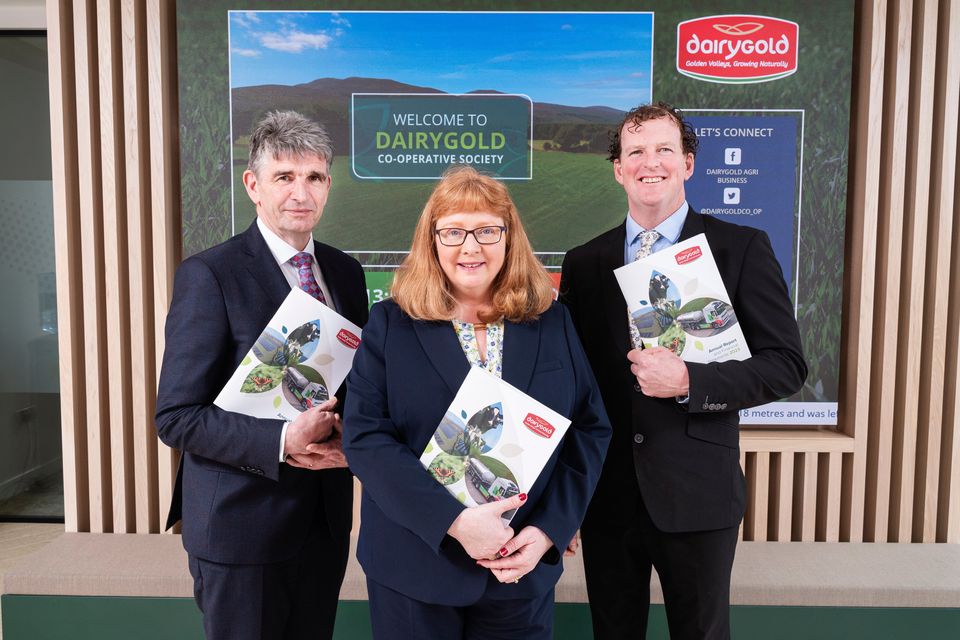Dairygold cuts profits to help farmers after ‘challenging’ year
Michael Harte, Ann Fogarty and Sean O Brien, at the launch of the Dairygold Annual Report 2023
Dairygold cut back its profits last year to support its milk and grain prices for farmers, after a "challenging" year due to decreased Chinese demand and reduced consumer spending.
The Cork co-op recorded a turnover of €1.4bn, a decrease of €254m versus 2022, primarily reflecting the significant fall in market returns over the course of 2023, it said.
Turnover was down to €1.4bn, a decrease of 15pc, due to global demand for dairy products being down significantly. "This was driven by a decline in Chinese demand, a reduction in consumer spend driven by higher dairy prices and the global economic market, geopolitical challenges, including ongoing inflationary pressures and increased interest rates."
Its profitability was also lower than 2022, according to Interim Chief Executive Michael Harte who said this was due to the Board’s decision to pay strong milk and grain prices, minimising the impact of reduced on-farm margins. Profit after tax was €3.5m, compared to €23.2m in 2022. This was primarily due to a decrease in operating profit of €16.3m and an increase of €10.7m in net interest payable.
At its annual report launch, Michael Harte said it saw an increase in its net debt of 9.2pc to €12.2m, while its EBITDA was €55m and its operating profit was €23.9m, a decrease of €13.5m and €16.3m respectively.
He described the processor's performance as "solid" for 2023, in what was a challenging year and remains well placed for continued sustainable growth, but warned that it could be the second half of this year before global markets pick up.
Its Dairy Ireland Business saw significantly lower dairy market returns, reduced milk volumes and inflationary pressures. Last year it processed 1.41 billion litres of milk, a 4.7pc decrease (70m litres) year-on-year, while at farm level, milk production was challenging with a significant decline in milk price of c. 30pc and input costs remaining relatively high. In addition, adverse weather and sustainability concerns impacted milk production volumes, while feed and fertiliser sales were back due to reduced on farm margins and sustainability concerns.
Commenting on the results, Harte said: “2023 was a difficult year for the dairy and tillage sectors, as market returns declined significantly from the unprecedented highs of 2022. Unfavourable weather conditions, combined with continued high input and processing costs, created a perfect storm for farmers and processors alike."
He said the level of future milk volumes will largely depend on how the sustainability challenges are addressed by the dairy industry and this is a critical focus for the Society.
Calling for a four-year delay to any decision on the Nitrates Derogation, which if it is reduced further would "significantly curtail milk production, impacting the viability of the entire industry", Chairman Seán O’Brien said four years are needed to see the impact of sustainability measures on water quality.
He also said the co-op's decision to continue to support milk and grain prices would be reviewed on a monthly basis, but said they would "like to see a bit more profitability coming back into the business."
According to Michael Harte, sustainability is a key pillar of Dairygold’s strategy and is critical to the long-term success of the business and its Members. Since it began in 2023, our Grassroots Milk Supplier Sustainability Bonus Programme has seen participation grow rapidly with more than
90pc of its milk suppliers have signed up to its Sustainabilty Bonus Programme, while at processor level, it has developed a decarbonisation roadmap to reduce carbon emissions by 42pc by 2030.
Last year Dairygold acquired a 59pc shareholding in Vita Actives Limited in June 2023, which it says delivers "a key objective of our Health and Nutrition business of growing a life stage nutrition business across key selected geographies, enhancing margin for the Business and diversifying earnings.
"The acquisition is strategically important, allowing Dairygold to enter the fast-growing life stage nutrition sector, delivering higher margin for the Society and diversifying earnings. It is the ideal platform for Dairygold to build higher margin growth opportunities."
Join the Irish Independent WhatsApp channel
Stay up to date with all the latest news















